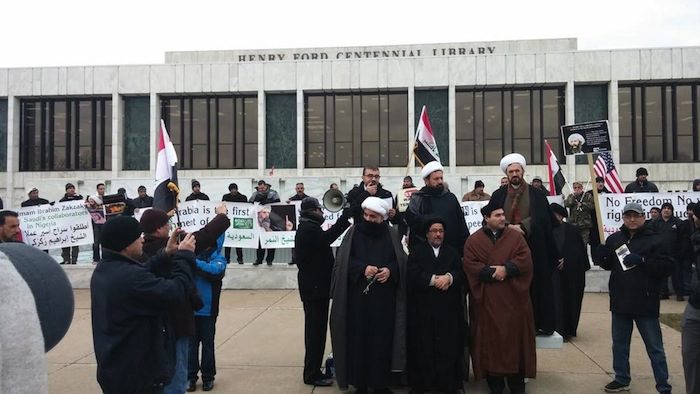
|
| A side of the anti-Saudi protest in Dearborn, Jan. 3 |
DEARBORN — Arab and Muslim American religious scholars and activists condemned Saudi Arabia’s Jan. 2 execution of Shi’a cleric Nimr al-Nimr.
Hundreds gathered at a demonstration in front of the Henry Ford Centennial Library in Dearborn on Sunday, chanting anti-Saudi slogans and demanding justice for the slain sheikh. Protesters also called on the United States to relinquish its alliance with Riyadh.
Nimr, an outspoken critic of the Saudi ruling family, was executed along with 46 others on terrorism charges. He led peaceful protests against the government before his arrest in 2012.
“Wahhabism is terrorism,” the protesters shouted in Dearborn, referring to Saudi Arabia’s fundamentalist sub sect of Islam.
Dr. Kamal Alsaedi, president of the International Organization for the Defense of Human Rights, urged Arab Americans to lobby the government to cut ties with Saudi Arabia.
The United States is a close ally of the Arab monarchy. In November, the State Department approved the sale of smart bombs worth $1.28 billion to Saudi Arabia.
“The Saudis are supporting terrorism in Syria and Iraq and Yemen,” he said. “They are executing innocents with the same sword of terrorism that ISIS uses.”
Alsaedi said it is laughable that the kingdom, which has an atrocious record, is heading the UN Human Rights Council.
Three Saudi students, who covered their faces out of fear of repercussion by their government, stood at the edge of the demonstration.
“The Saudi Shi’a community is oppressed,” one of the masked men said. “When we speak out for freedom and for our rights, they started killing us. They live in the palaces and we still live in tents, although all the oil is in our land, in the eastern province.”
Mohamad, who chose to be identified by his first name only, said the Saudi opposition is committed to non-sectarian and peaceful struggle.
“Sheikh Nimr al-Nimr did not have weapons or a militia, not even bodyguards,” he said. “He defended the rights of Sunnis before Shi’a.”
In a sermon posted in 2012, al-Nimr warned his followers against resorting to violence.
“Our strength is not with weapons, our strength is with the spirit of martyrdom,” he said.
Mohamad added that the Saudi regime’s tyrannical policies are not sustainable, predicting that the government will fall within two years.
The Islamic House of Wisdom described the Saudi royal family as the founders of ISIS and al-Qaeda.
“The evil murderers of the Saudi kingdom started this New Year with one of their worst crimes in their history of insanity, barbarianism, bloodshed and crimes against humanity,” Imam Mohammad Ali Elahi, of IHW, said in an email.
Sayed Hassan Qazwini said killing al-Nimr will be the beginning of the end of the Saudi monarchy.
“Sheikh al-Nimr did not do anything to merit this heinous crime,” Qazwini said in a statement. “He only criticized the corrupt Saudi regime and demanded the rights of his oppressed people.”
The Islamic Society of North America (ISNA) also denounced Saudi Arabia for the execution.
“The actions taken by the Saudi government against its critics like Sheikh Nimr in the name of counter-terrorism undermine the unity of the worldwide Muslim community and violates the protection of religious minorities,” ISNA President Azhar Azeez said in a news release.
The execution led to a diplomatic confrontation between Saudi Arabia and Shi’a regional power Iran. Protesters attacked the Saudi embassy in Tehran after al-Nimr’s death, prompting the Saudi embassy to sever diplomatic relations with Iran.
Yemeni American activist Akram Alward said the execution will deepen the sectarian rift in the region.
“Killing al-Nimr for no reason is an inexcusable crime,” he said. “Al-Nimr represent a big sect. His death will rip the social fabric of Saudi society.”
Alward added that Saudi policies have been destructive, especially in Yemen.
“Saudi Arabia is a cancerous tumor in the region,” he said.






Leave a Reply